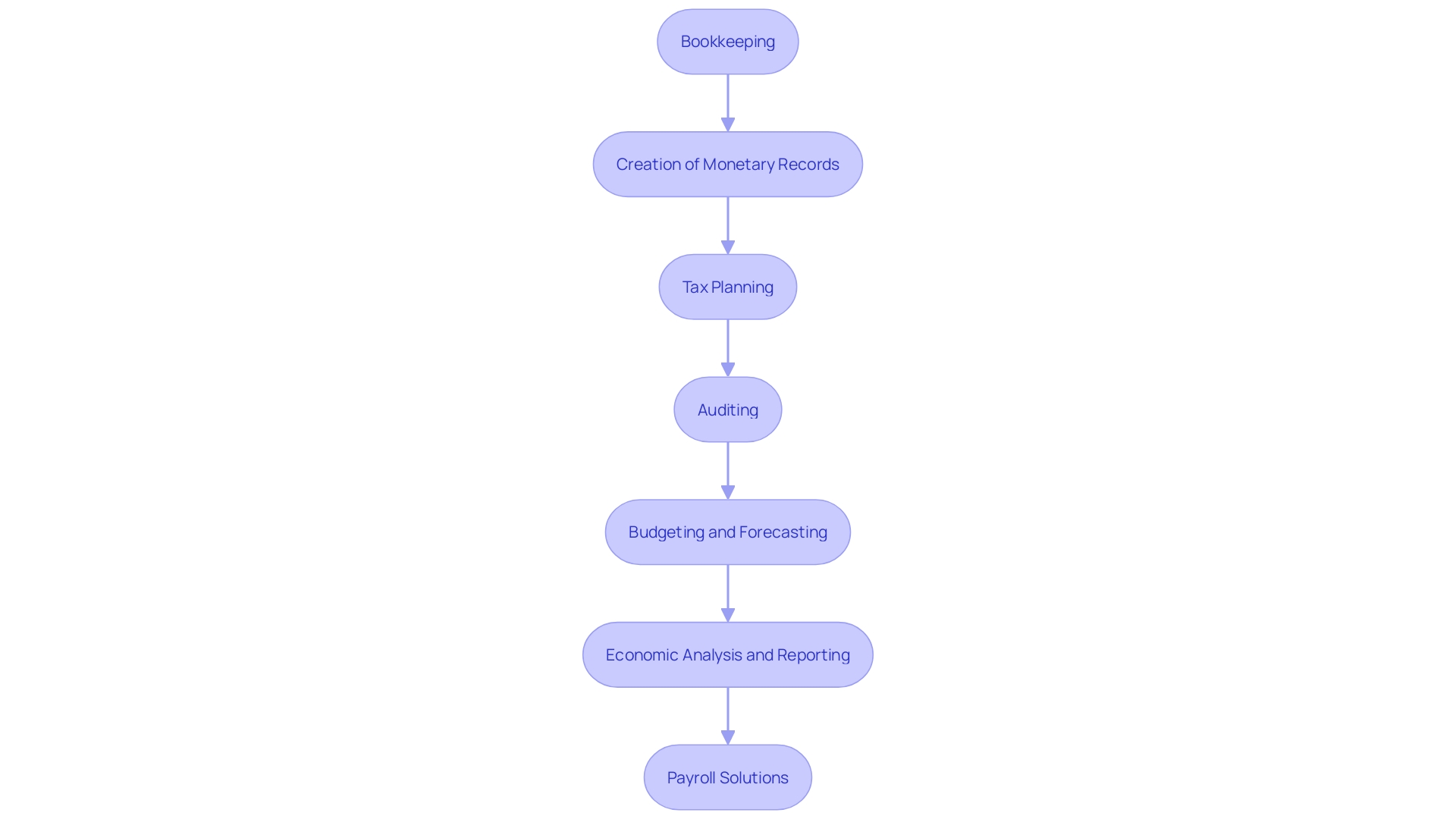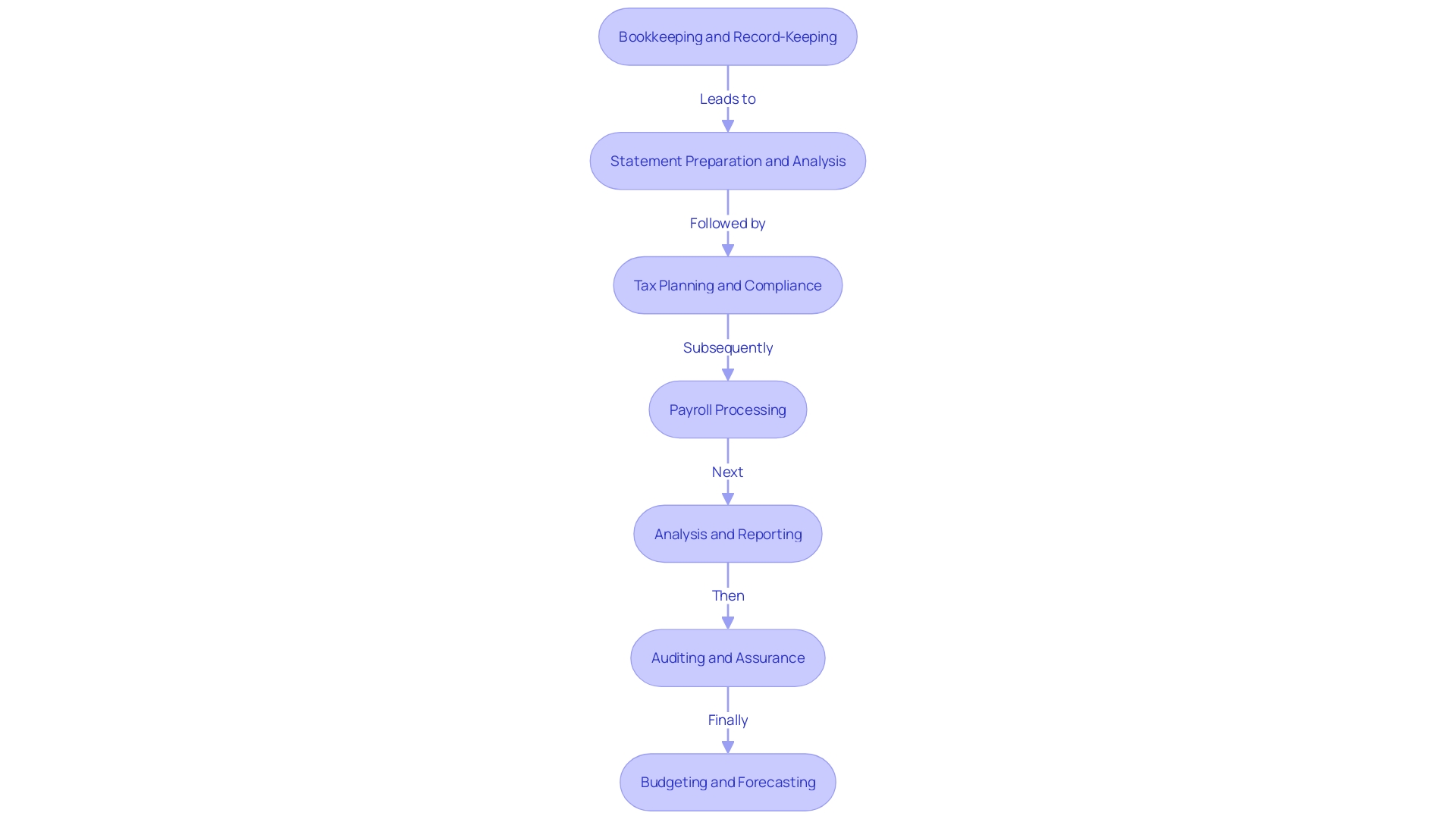Introduction
Accounting services are an essential component of effective financial management for businesses of all sizes. These services encompass a range of functions that go beyond basic bookkeeping, including financial statement preparation and analysis, tax planning and compliance, financial analysis and reporting, payroll processing, budgeting and forecasting, and auditing and assurance. By leveraging these services, businesses can optimize their financial health, ensure compliance with financial regulations, and make informed decisions that drive growth and profitability.
In an era of technological advancements, artificial intelligence is revolutionizing the accounting industry, providing automation, precision, and valuable insights. With recent tax adjustments announced by the IRS, staying attuned to financial regulations has become even more critical. Accounting services are not just about maintaining records; they are about understanding and leveraging financial data for sustainable success.
In this article, we will explore the various types of accounting services and their importance in supporting businesses' financial strategies and operations.
Definition of Accounting Services
Comprehending the intricate realm of accounting is essential for any business. These services encompass the systematic recording, analysis, and interpretation of economic data, which are cornerstones of sound economic management and informed decision-making. At the core of this practice is the creation of statements that depict a company's monetary activities, offering a clear picture of its fiscal health.
The difference between bookkeeping and accounting is significant; while bookkeeping involves the daily recording of transactions, accounting delves deeper into analyzing and summarizing monetary data to offer strategic insights and direction. Accountants go a step further than just recording transactions—they create comprehensive reports, audit records, and extend strategic counsel to steer organizations towards informed decisions.
Accounting is not just a foundational element for businesses—it's essential. It's the monetary compass that directs companies, big or small, to grow and thrive. A strong financial framework enables companies to interpret the story told by their financial data, helping them make decisions that push them forward.
With the emergence of Artificial Intelligence (AI), the financial sector is undergoing a transformative shift. AI brings automation, enhanced precision, and invaluable insights that were once hindered by the limitations of manual financial management. Ai's ability to process vast volumes of data uncovers patterns and informs decisions, which is reshaping the industry by reducing human errors and mitigating fraudulent activities.
In the modern business world, managerial finance is becoming more and more crucial. It varies from the field of money management by focusing on creating detailed monetary documents used by internal decision-makers instead of external entities. These internal reports are crucial for strategic planning and are typically produced more frequently—monthly or quarterly—to ensure timely and effective decision-making.
The significance of financial management is further emphasized by recent tax adjustments announced by the IRS, which will impact various tax provisions in 2024. These adjustments indicate the requirement for enterprises to remain aware of monetary regulations and adjust their fiscal planning and strategies accordingly.
The influence of financial record-keeping on a company's prosperity cannot be exaggerated. It's not just about maintaining records; it's about understanding and leveraging those records for sustainable growth and profitability. Whether it's retail, healthcare, or professional sectors, accounting remains a foundation of a flourishing enterprise, with industries like management consulting alone generating $365.8 billion in 2022.
Types of Accounting Services
Accounting functions encompass a myriad of crucial activities tailored to support businesses in their financial management. These offerings are not one-size-fits-all; they are as varied as the unique needs of different companies. At the heart of these offerings lies bookkeeping, a meticulous process that involves the recording and organizing of sales, purchases, payments, and receipts. It's an essential step that guarantees all monetary transactions are accurately captured.
In addition to the fundamentals, the creation of monetary records is an offering that presents a transparent image of a company's economic well-being. These documents, such as income statements and balance sheets, are not just retrospective reports but vital tools for strategic decision-making. Tax planning and compliance is another crucial offering that aids enterprises strategically reduce tax liabilities while strictly adhering to tax laws.
Auditing services play a defensive role, offering an independent examination of records to validate their accuracy and ensure adherence to accounting standards. On the other hand, budgeting and forecasting are more aggressive tactics, aiding organizations in outlining their economic future and getting ready for expansion with informed predictions.
The field of economic analysis and reporting delves deeper, offering companies with a perspective through which they can comprehend performance trends and make data-driven decisions. In the modern era, where small business accounting has been challenged by software limitations, new solutions like artificial intelligence are revolutionizing the industry. Ai's ability to process massive volumes of data and recognize patterns enhances the accuracy and predictive power of monetary analyses.
Finally, payroll solutions relieve the intricate duties of computing and handling employee wages, taxes, and benefits. This not only saves time but also ensures compliance with employment and tax laws.
Each of these offerings plays a crucial part in the fabric of fiscal oversight and, when employed proficiently, they can protect enterprises from the hazards of adherence concerns and position them for prosperous expansion.

Why Accounting Services Are Essential for Businesses
Accounting services are a linchpin in the structure of any company, serving multiple essential functions that are key to operational success. They facilitate accurate monetary management by monitoring and evaluating income, expenses, and cash flow, thereby equipping organizations to optimize their fiscal well-being. Furthermore, they play a vital role in upholding compliance with intricate monetary regulations, guaranteeing organizations fulfill reporting criteria and steer clear of possible legal consequences.
The significance of accounting assistance extends into the strategic sphere, offering insights that propel company growth and enhance profitability. Through the analysis of financial data, accountants aid in identifying opportunities, overseeing budgets, predicting future financial scenarios, and discovering potential cost savings. These offerings are not only about number-crunching; they provide a strategic advantage, enabling well-informed decision-making across the entire range of commercial activities, from evaluating investments to assessing project feasibility and developing pricing tactics.
Moreover, financial management plays a crucial role in tax administration, assisting enterprises in maneuvering through the constantly evolving tax laws. By engaging in careful preparation and identifying relevant deductions, companies can reduce tax responsibilities and guarantee prompt adherence to tax filing obligations.
Essentially, the function of accounting assistance is of utmost importance; it is essential to the financial strength and tactical flexibility of an organization, establishing the foundation for well-informed decision-making and enduring expansion.
Key Accounting Services Offered
Accounting is crucial for businesses of all sizes, providing a range of solutions to manage finances with precision and strategic insight. These services encompass:
-
Bookkeeping and Record-Keeping: Essential for maintaining a clear picture, this service involves meticulous recording of transactions, upkeep of ledgers, and bank reconciliations, ensuring every dollar is accounted for.
-
Statement Preparation and Analysis: Beyond drafting key documents such as income statements and balance sheets, accountants delve into data interpretation, equipping businesses with a comprehensive understanding of their fiscal health.
-
Tax Planning and Compliance: Navigating the complex world of tax laws, accounting firms provide strategic tax planning, thorough preparation and filing of tax returns, and adept handling of audits, all while pinpointing opportunities for tax savings.
-
Analysis and Reporting: Through detailed scrutiny, accountants craft insightful reports unraveling a company's economic performance, including profitability, budgetary deviations, and cash flow trends.
-
Payroll Processing: This service streamlines payroll management by calculating wages, taxes, and benefits, while ensuring adherence to regulatory demands.
-
Accountants play a crucial role in creating budgets and forecasts, guiding organizations towards prudent planning and well-informed decision-making.
-
Auditing and Assurance: Conducting rigorous audits, financial professionals affirm the integrity of financial records and compliance with established financial standards.
By utilizing these offerings, companies can concentrate on fundamental areas of expertise, as demonstrated by Diana Cupps Law, where effective payment solutions have enabled enhanced delivery of services. In the same way, Accountology's knowledge provides businesses with economical proficiency in financial management, freeing up time and resources. The investment in Baker Tilly's Family Office practice exemplifies the value of integrated accounting services, relieving the management burden for families. Keeping abreast of fiscal adjustments, such as the IRS's inflation adjustments for the 2024 fiscal year, is crucial for businesses to stay ahead in their financial strategy.

Conclusion
In conclusion, accounting services are vital for businesses. They encompass financial statement preparation, tax planning, financial analysis, payroll processing, budgeting, forecasting, and auditing. Leveraging these services allows businesses to optimize financial health, ensure compliance, and make informed decisions.
With the rise of artificial intelligence, the accounting industry is undergoing a transformative shift. AI brings automation, precision, and valuable insights, reducing errors and fraud. Managerial accounting is increasingly important in the modern business environment.
Accounting services support financial strategies and operations. They enable precise financial management, maintain compliance, and drive growth. By analyzing financial data, accountants identify opportunities, manage budgets, forecast scenarios, and find cost savings.
Tax management is crucial for navigating regulations and minimizing liabilities.
Key accounting services include bookkeeping, financial statement preparation, tax planning, financial analysis, payroll processing, budgeting, forecasting, and auditing. By leveraging these services, businesses can focus on core competencies, improve service delivery, and reduce financial management burdens.
In summary, accounting services are integral to a business's financial fortitude and strategic agility. They provide tools and insights for success. By harnessing accounting services, businesses can navigate complexities and position themselves for sustainable growth.




